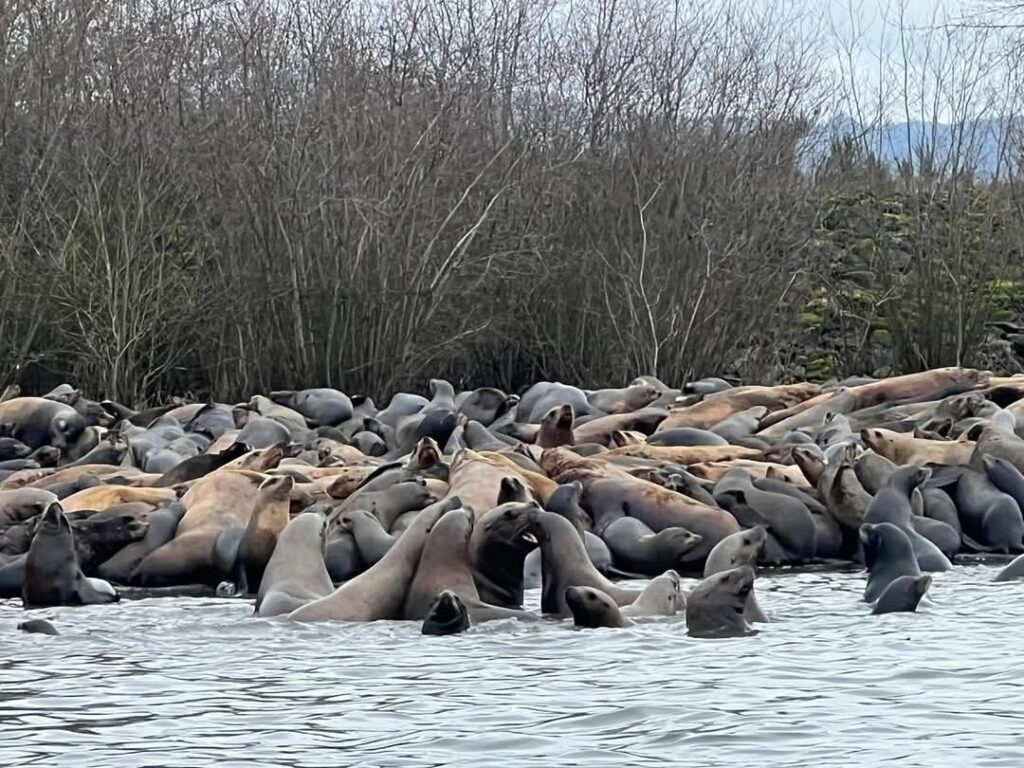Note: The following e-newsletter was sent to Sen. Jeff Wilson’s subscribers March 19, 2025. To subscribe to Sen. Wilson’s e-newsletters, click here.
It’s dinnertime on the Cowlitz as sea lions prepare a warm welcome for our struggling fish runs. This shot was snapped last weekend near the confluence of the Cowlitz and the Columbia. Sea lion populations on the Columbia and its tributaries have doubled since 2005, and each one of these creatures eats about 40 pounds daily. / Credit: Rod Dayton.
Dear Friends and Neighbors,
The sea lions are back, and the swarms we are seeing on the Columbia and its tributaries are bigger than ever. Last weekend we were witnessed scenes like the one above at the mouth of the Cowlitz, where Herschel and his hungry friends are waiting for dinner to arrive.
Experts tell us we lose about 12 percent of our struggling salmon runs to predation, and that figure is no doubt out of date, given the growing size and aggressiveness of the sea lion population. Sea lion counts have doubled over the last 20 years. Last spring, as smelt were making their way downriver, sea lions swam 70 miles up the Cowlitz to the barrier dam, farther than ever before. As a result of predation, salmon and steelhead runs in some areas could be wiped out.
I am proposing a special appropriation of up to $3.5 million to help the state Department of Fish and Wildlife combat this sea lion threat. Even in a year like this one, when a massive budget shortfall makes most new spending unviable, we need to recognize this is an environmental emergency. A failure to act now could undo much of our work to revive our struggling fish runs and force us to write off the hundreds of millions of dollars we have already invested in salmon restoration.
Already our state is working with the state of Oregon to capture and cull sea lions near Bonneville Dam, helping save tens of thousands of threatened and endangered fish, and improving prospects these fish runs will survive. Our state’s permit from the National Marine Fisheries Service also allows us to control sea lions on lower Columbia tributaries. To expand this effort, WDFW will need to purchase specialized equipment designed for use on the shallower Cowlitz and Lewis rivers.
This is the second year I have proposed a special appropriation for sea lion control. Last year I obtained a $1.5 million appropriation for this purpose in the Senate version of the budget, but it did not survive in the final budget we passed. I think the problem is that too many people have the impression that sea lions are cute, cuddly creatures, and not the full-time eating machines they are. Nor is there anything natural about the rapid growth of the predator population.
Money will be tight this year. But if we fail to act, we could be facing an environmental catastrophe of the sort we saw at the Ballard Locks 30 years ago, where sea lions feasted while politicians dithered. By the time anyone was ready to get serious about the problem, some Lake Washington runs were already functionally extinct. Let us learn from this mistake, and declare that we will never let it happen again.
Praise for an innovative housing proposal that puts apartments in vacant malls
And let’s give credit where it is due
In this Providence, R.I. shopping mall, upper floors have been converted into apartments. Housing conversions are a small but growing trend, and Washington should capitalize on it. / Credit: CC-by-4.0 Rhododendrites
Today’s edition of the Seattle Times offers a strong endorsement for a bill I introduced this session to transform commercial blight into new housing opportunities. SB 5749 makes it easier to redevelop disused malls, stores and other commercial properties for housing. Cities would be allowed to designate these areas as “housing opportunity zones,” where more flexible zoning rules would apply and development impact fees could be waived. Developers would be able to utilize existing permits and infrastructure. Already we are seeing this type of development on some commercial properties, but this legislation would make it far easier.
This bill passed the Senate 47-2 and now awaits consideration in the House. I want to thank those on my staff who worked to flesh out this idea, among them my legislative assistant Jami Lund and my session intern Cobi Clark, as well as Lieutenant Gov. Denny Heck, whose encouragement was a major inspiration. As the Seattle Times observes, “With the Legislature’s approval, cities can give underperforming commercial properties a new lease on life. Given the depths of the housing crisis, just one project penciling out would make Wilson’s bill worth doing.”
Let the budget debate begin!
We’ve reached the point in our 2025 legislative session when our attention turns to the state budget. This will remain our focus until we adjourn on April 27. Watch for one of the nastiest and most bruising budget debates ever as we confront a multi-billion-dollar deficit that should never have happened. Our majority colleagues want to raise taxes to cover the mistakes they have made over the last several years and keep right on making them. Here’s what you need to know as this debate begins:
- We have plenty of money coming in. Even though our latest revenue forecast Tuesday reduced projections by about $850 million, state tax collections still will rise about $4.5 billion over the next two years, a 6.8 percent increase — far more than most of us can expect to see in our own household budgets.
- The deficit is in the $7 billion range. That’s the cost to maintain current programs, on top of what we will be taking in. That’s pretty bad. But our friends want us to believe the problem is even worse. They are saying the deficit is somewhere around $12 billion or even $16 billion. What they aren’t telling you is that they are including state-employee pay raises and big new spending for state programs we simply can’t afford. It appears they haven’t let this massive shortfall dampen their enthusiasm for spending money they don’t have.
- This is entirely the result of irresponsible spending. Usually budget crises are the result of recession or some other external cause. But this crisis is owned entirely by our majority colleagues. Since 2019 they have spent about $9 billion more than we had coming in, raided reserves, and used one-time money to launch permanent spending obligations.
- Taxes are the first resort for our majority colleagues. A widely circulated memo at the start of the session indicates they want to scapegoat the wealthy as “villians” and sock them with a never-before-tired “wealth tax,” sort of a property tax on stocks, bonds and other investments. Watch what happens when job creators flee the state.
- We can balance the budget without new taxes. Last week the Senate Republican Caucus released our “$ave Washington” budget proposal showing that it can be done. We can avoid harmful cuts to state programs by avoiding big new non-emergency spending and enacting obvious efficiencies. It’s really that simple. You can learn more about our proposal here.
Thanks for reading!
Sen. Jeff Wilson
19th Legislative District
Contact me!
Email: Jeff.Wilson@leg.wa.gov
Mailing address: P.O. Box 40419 /Olympia, WA 98504
Leave a message on the Legislative Hotline: 1-800-562-6000
Take our survey: Let us know what you think at http://www.JWilsonSurvey.com
To unsubscribe from these regular updates from Olympia, go to the Subscriber Preferences Page below.













